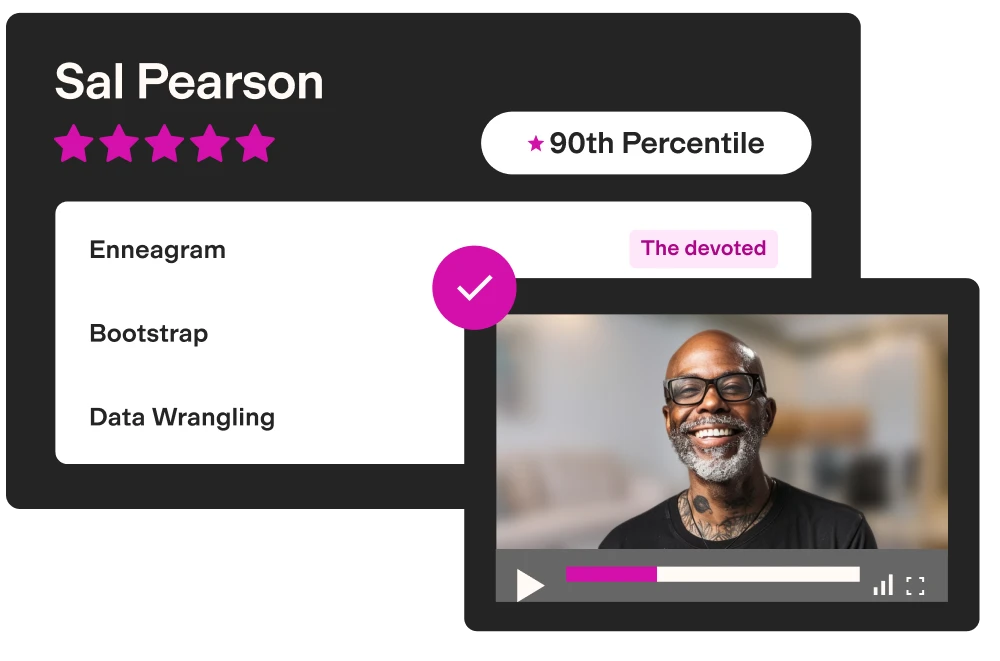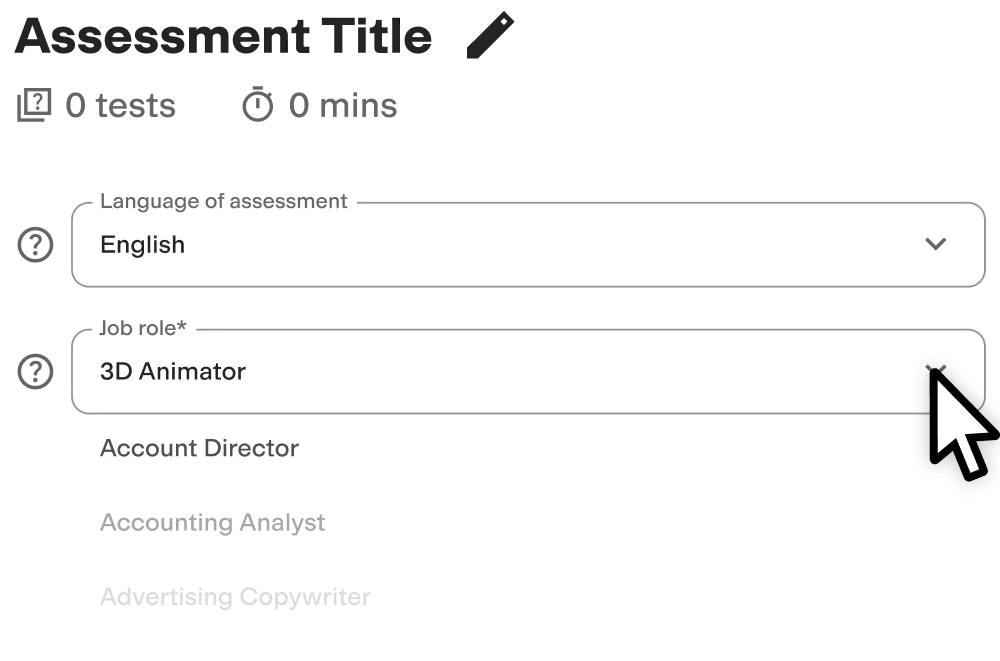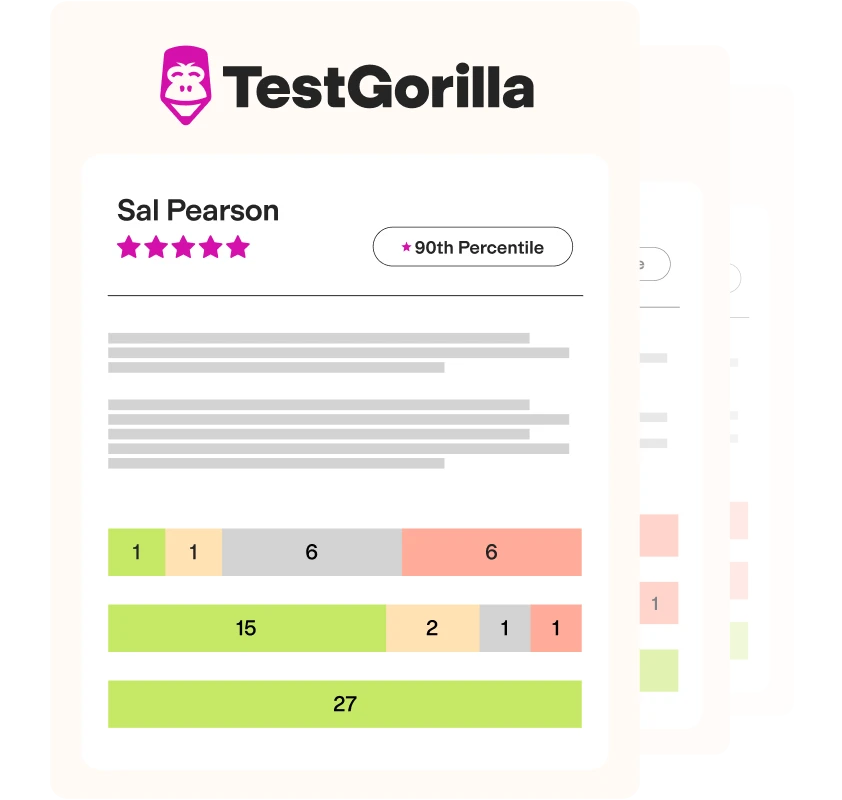Software Engineer test
Summary of the Software Engineer test
Our Software Engineer test measures candidates’ knowledge of the basic principles, methodologies, and frameworks of software engineering. The test helps you identify candidates who can approach problems using “software engineer thinking” to solve problems efficiently and effectively.
Covered skills
Linear data structures
Non-linear data structures
Algorithm analysis
Computer science fundamentals
Use the software engineer test to hire
Software engineers, front-end developers, back-end developers, software quality engineers, full-stack developers, systems analysts, mobile application developers, game designers, and any roles that follow computer science and software engineering principles
About the Software Engineer test
Software engineers are responsible for most steps in the development process for apps and programs, including designing, building, and maintaining them. You might also know them as systems and application developers – they all dabble in complex code, algorithms, and computer science.
This Software Engineer test assesses candidates’ understanding of computer science fundamentals and their knowledge of software data structures and algorithms.
It doesn’t focus on the tester’s ability to write code in any language in particular, meaning recruiters can use it to find developers and engineers who design, build, and test software for any purpose.
Through multiple-choice questions, this test asks candidates to identify problems and figure out the best solutions using “software engineer thinking.”
For example, they might answer questions about:
Editing and refining code
Maintaining software systems
Building search trees
Analyzing and adjusting algorithms
Applying basic computer science to solve software bugs and flaws
Candidates who perform well in software engineering testing are:
Knowledgeable about algorithms and software design principles
Adept at writing, editing, and implementing code to build custom software
Proactive and conscientious with good eyes for detail
Adaptable to working with different projects, coding languages, and operating systems
Before you get started, take a tour of the Software Engineer test with a few preview questions.
The test is made by a subject-matter expert
TestGorilla’s tests are created by subject matter experts. We assess potential subject-matter experts based on their knowledge, ability, and reputation.Before being published, each test is peer-reviewed by another expert, then calibrated using hundreds of test takers with relevant experience in the subject.
Our feedback mechanisms and unique algorithms allow our subject-matter experts to constantly improve their tests.
Yashavant K.
Over the last 25 years, Yashavant has published numerous books and online courses in C, C++, Data Structures, VC++, .NET, and Embedded Systems. A sought-after speaker, Yashavant has given presentations and workshops at TedEx, IITs, NITs, IIITs, and global software companies.
In recognition of his contribution to IT education, he has been awarded the "Best .NET Technical Contributor" and "Most Valuable Professional" awards by Microsoft and the “Distinguished Alumnus Award” by IIT Kanpur.
Use TestGorilla to hire the best faster, easier and bias-free
Our screening tests identify the best candidates and make your hiring decisions faster, easier, and bias-free.
Create high-quality assessments, fast
Building assessments is a breeze with TestGorilla. Get started with these simple steps.
Why are software engineering skills important to employers?
Employers rely on talented software engineers to support internal production and improve end-user experiences.
In fact, software engineers are responsible for many important tasks from day to day. For example, they create, maintain, and audit systems to ensure they work optimally, meet organizational demands, and design tests for systems to find their faults.
The average software developer/engineer also writes a lot of code in languages such as Python, JavaScript, Java, C# (C Sharp), C, C++, and Go.
By hiring top talent through software engineer testing, development teams find it easier to:
Design high-quality custom programs to fit customer needs
Boost in-house productivity
Ensure they meet compliance demands
Keep employees and users safe and secure
Fix technical problems efficiently
Keep production flowing so deadlines are met
Maintain stakeholder confidence
What’s more, software engineers are often agile and receptive to changing projects and learning new skills and coding languages.
Software engineering testing: 4 competencies to look for
Our Software Development Engineer test measures competency in the following areas:
Linear data structures: Does the candidate understand how structures in a linear setup work together and how to optimize them?
Non-linear data structures: Can the applicant read and manipulate unorganized structures such as trees, hashmaps, and graphs?
Algorithm analysis: Can the candidate read and understand typical software algorithms and carefully analyze them to solve problems?
Computer science fundamentals: Does your applicant understand basic programming languages, statistical modeling, and how to manipulate different data structures?
What job roles can you hire with our software engineering test?
Software engineering is a broad term that covers many tech industry roles and specializations. Here are just a few important career paths where using our Software Engineering test can help you find the best candidates:
Software engineers analyze algorithms, edit and maintain code, resolve bugs, and design custom programs and apps
Front-end developers build user interfaces such as apps and websites through languages like HTML
Back-end developers manage apps, websites, and other services behind the web development scenes, ensuring code is clean and efficient
Software quality engineers engage in software testing and auditing so that it functions properly and fits quality assurance guidelines for public or commercial use
Full-stack developers handle both front and back-end development, ensuring code is functional and that user experience is optimal
Systems analysts investigate and analyze complex systems and fix errors and efficiency issues via coding
Mobile application developers design, build, and maintain applications specifically for smartphones and tablets
Game designers create and code games and interactive experiences for different platforms, such as PCs, consoles, and mobile devices
TestGorilla makes it easy for development teams, like those at Visionaries FZ-LLC, to make technical hiring more efficient and sustainable.
In fact, the UAE-based firm now saves around 15 hours per hire just by using skills testing during recruitment.
Create a multi-measure assessment: 4 tests to pair with software engineer testing
Although our Software Engineer test covers many technical skills your ideal recruits need, we recommend running multiple types of tests so you hire balanced candidates.
With TestGorilla, you can create a custom multi-measure assessment containing up to five technical and soft skill tests. You can even get test results for candidates based on their personality and culture add so that you’re crystal clear on who you want to hire.
Here are four tests we suggest using alongside software engineer testing to help you find talented, well-rounded developers:
Clean Code test: Hire a software engineer who can streamline code so it’s easy to maintain
A programming language test: Assess your candidates’ knowledge of one or more programming languages that are relevant to your in-house development needs, such as Python or Ruby
Problem Solving test: Hire an engineer with a solution-focused mindset who can analyze bugs and faults and use different tools and techniques to fix them
Communication Skills test: Recruit engineers with strong communication skills for working well with other engineers and actively listening to important instructions, ensuring code and projects are accurate
Still unsure about software engineer employer assessment tests? Use our recruitment ROI calculator and find out how much time and money you could save with TestGorilla.
FAQs
View a sample report
The Software Engineer test will be included in a PDF report along with the other tests from your assessment. You can easily download and share this report with colleagues and candidates.







